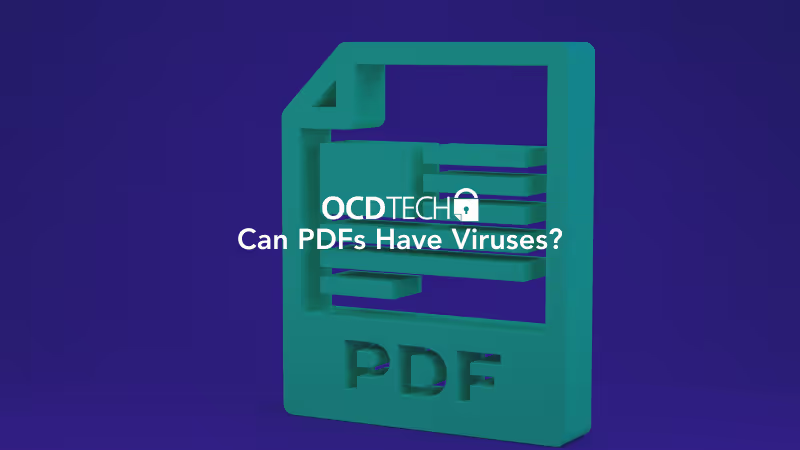By
OCD Tech
November 24, 2025
•
2
min read

PDFs appear harmless at first glance: clean documents, perfect formatting, and universal compatibility. That trust is exactly why cybercriminals love them. Their flexibility—hyperlinks, forms, multimedia, and scripts—creates room for both convenience and exploitation. Understanding how PDFs can be weaponized is the first step toward staying safe.
Originally designed to keep documents consistent across devices, PDFs became the standard for sharing contracts, reports, resumes, and more. Over time, features like embedded links, videos, and interactive elements transformed them into powerful containers. That same versatility allows attackers to hide malicious code inside what looks like a normal document.
PDFs can contain dynamic components such as scripts. Cybercriminals exploit this capability by embedding malicious code that executes when the file is opened.
These attacks can:
Attackers frequently send PDFs that appear to be invoices, reports, or account notices. These documents may redirect users to fraudulent login pages designed to steal credentials. Red flags include unexpected senders, urgent language, odd file sizes, or strange behavior after opening the file.
PDF readers like Adobe Acrobat occasionally contain bugs that attackers can exploit. Specially crafted PDFs can trigger these weaknesses and execute unauthorized actions. Keeping your PDF reader updated is essential—patches often fix these exact vulnerabilities.
PDFs can carry adware, spyware, ransomware, or other malicious payloads. This risk increases when the file comes from an unknown sender, appears unexpectedly, or is downloaded from an untrusted website.
Common warning signs include:
Practical steps that reduce risk include:
Opening a suspicious PDF doesn’t automatically mean disaster—just act quickly. Run a full antivirus scan, monitor your accounts, and change passwords if you suspect compromise.
Generally, yes—Gmail scans attachments for malware. But no automated system is perfect. Always verify the sender and stay alert for unusual requests or unexpected files.
PDFs are convenient and widely trusted, but they’re not immune to exploitation. With basic precautions and a healthy dose of skepticism, you can use PDFs with confidence and avoid falling victim to cyber threats.

Audit. Security. Assurance.
IT Audit | Cybersecurity | IT Assurance | IT Security Consultants – OCD Tech is a technology consulting firm serving the IT security and consulting needs of businesses in Boston (MA), Braintree (MA) and across New England. We primarily serve Fortune 500 companies including auto dealers, financial institutions, higher education, government contractors, and not-for-profit organizations with SOC 2 reporting, CMMC readiness, IT Security Audits, Penetration Testing and Vulnerability Assessments. We also provide dark web monitoring, DFARS compliance, and IT general controls review.
Contact Info
.svg)
OCD Tech
.svg)
25 BHOP, Suite 407, Braintree MA, 02184
.svg)
844-623-8324
.svg)
https://ocd-tech.com
Follow Us
Videos
Check Out the Latest Videos From OCD Tech!
Services
SOC Reporting Services
– SOC 2 ® Readiness Assessment
– SOC 2 ®
– SOC 3 ®
– SOC for Cybersecurity ®
IT Advisory Services
– IT Vulnerability Assessment
– Penetration Testing
– Privileged Access Management
– Social Engineering
– WISP
– General IT Controls Review
IT Government Compliance Services
– CMMC
– DFARS Compliance
– FTC Safeguards vCISO